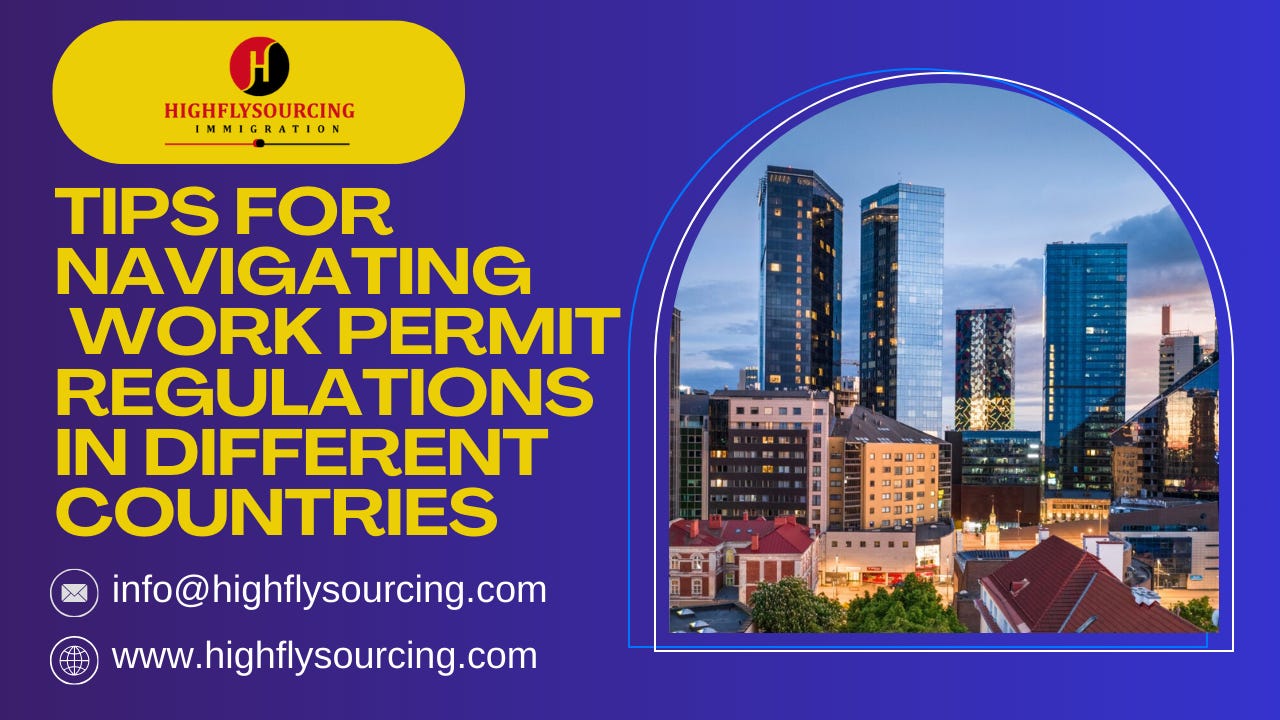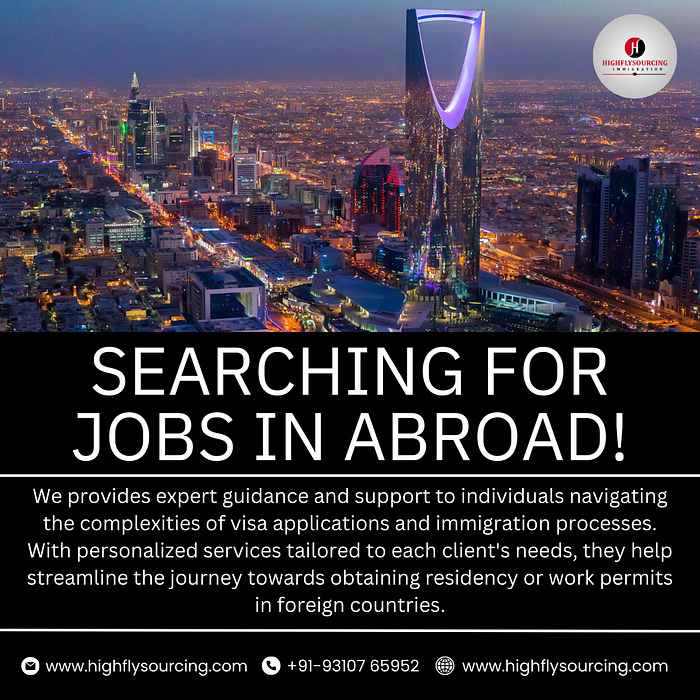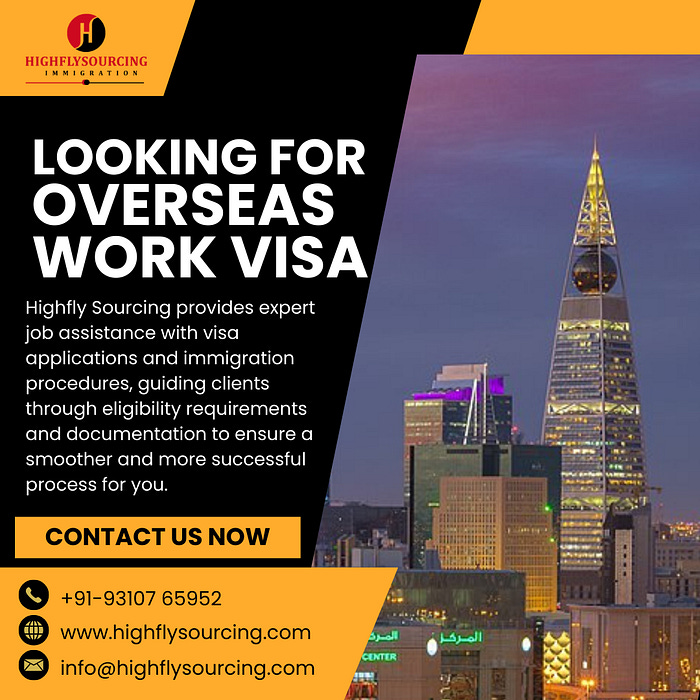
In today’s interconnected world, professionals and skilled workers are increasingly looking beyond their home borders for career opportunities. Securing the right to work in a foreign country often requires obtaining a work permit, which can be a complex and daunting process due to differing rules and regulations across borders. Whether you’re looking to work in Europe, Asia, the Middle East, or the Americas, understanding how to navigate these regulations is essential to avoid costly delays or rejections.
This blog provides detailed insights into the process of obtaining a work permit in various countries and how a visa immigration consultant can simplify this journey for you.
Understanding Work Permit Regulations Around the World
Work permits, sometimes referred to as work visas, allow foreign nationals to legally work in another country. However, the specific requirements, documentation, and processing time for a work permit vary greatly depending on the destination country.
Key Factors to Consider When Navigating Work Permit Regulations:
1. Eligibility Criteria
Work permits are typically based on the type of job, your qualifications, and the employer’s need for foreign talent. Many countries prioritize applicants with skills that are in short supply locally. Some countries may also issue work permits based on the applicant’s nationality, as specific countries may have special agreements or reciprocal arrangements for work visas.
2. Type of Work Visa
There are different categories of work permits. These can include:
- Temporary work permits for seasonal, short-term employment.
- Permanent work permits for individuals seeking long-term employment and residency.
- Specialized worker permits for highly skilled professionals like engineers, doctors, or IT specialists.
- Intra-company transfer visas for employees who are transferred from a parent company in one country to its branch in another.
3. Documentation
The documentation required varies from one country to another. Common documents include:
- Valid passport and visa application form.
- Proof of employment or a job offer from a company in the host country.
- Proof of qualifications (degrees, diplomas, certifications).
- A health and police clearance certificate.
- Financial statements to show you can support yourself during your stay.
4. Application Process
The application process may involve:
- Submitting the required documents to the immigration office or embassy.
- Attending interviews or medical examinations, depending on the country’s regulations.
- Paying application fees and processing charges.
- Waiting for approval, which can take weeks or months depending on the country.
5. Duration and Renewal of Work Permits
Work permits are typically issued for a limited duration. Some countries offer the possibility of extending the permit, while others may require you to leave once your work permit expires. Understanding the timelines and renewal processes is critical to avoid interruptions in your employment.

Work Permit Regulations in Key Countries
Let’s take a look at how work permit regulations differ in some of the world’s most popular destinations for foreign workers:
1. United States
The U.S. offers a variety of work visas, such as the H-1B visa for specialized workers, the L-1 visa for intra-company transferees, and the O-1 visa for individuals with extraordinary skills. One of the challenges in the U.S. is the annual cap on certain visa types (e.g., H-1B), making the process highly competitive. Additionally, visa holders may face delays due to backlogs or changes in immigration policies.
Tip: Start your application process early and seek a legal expert’s advice to navigate the complexities of the system.
2. United Kingdom
The UK’s work permit system is governed by the Points-Based Immigration System, which requires applicants to score points based on factors like job offer, salary, and English language proficiency. The Tier 2 visa, for skilled workers, is one of the most common permits. However, it requires an employer’s sponsorship, and there’s a minimum salary threshold that must be met.
Tip: Employers must be licensed sponsors to hire foreign workers, so make sure your prospective employer is registered with the UK government.
3. Canada
Canada has a relatively straightforward work permit system, with both open and closed work permits available. The closed work permit requires a specific job offer from a Canadian employer, while an open work permit allows you to work for any employer in Canada. Additionally, the Express Entry system helps skilled workers gain permanent residency through work experience.
Tip: The process for obtaining a work permit is easier for applicants who are highly skilled or have a job offer from a Canadian employer. Ensure that your qualifications match the National Occupational Classification (NOC).
4. Australia
Australia’s work permit system, known as the Temporary Skill Shortage (TSS) visa (subclass 482), allows skilled workers to live and work in Australia for up to four years. Applicants need to prove that their job is on Australia’s Skilled Occupation List and meet specific skills and language requirements.
Tip: Seek help to determine whether your occupation is in demand and the appropriate visa subclass for your situation.
5. Germany
Germany’s Blue Card program is an EU-wide initiative that allows highly skilled non-EU workers to work and live in Germany. To qualify, applicants must have a recognized university degree and a job offer with a certain minimum salary. The process can be competitive, especially for certain industries.
Tip: Germany offers a fast-track visa for specific professionals like engineers, IT specialists, and healthcare workers. Make sure your qualifications are recognized in Germany.
How Visa Immigration Consultants Can Help
Navigating the intricacies of work permit regulations can be overwhelming, especially when dealing with bureaucratic hurdles, language barriers, and changing immigration laws. This is where a visa immigration consultant can be a valuable resource.
1. Expert Guidance on Eligibility
Visa consultants specialize in understanding immigration laws and can help you assess your eligibility for different work permits. By reviewing your qualifications, job offer, and personal circumstances, they can guide you through the application process and recommend the best visa options for your situation.
2. Streamlined Application Process
The work permit application process can be complicated, with numerous forms to fill out and documents to submit. Consultants help ensure that your application is complete, accurate, and submitted on time. They also help you prepare for interviews or medical examinations, ensuring you meet all the necessary requirements.
3. Minimizing Errors and Delays
One of the biggest challenges in securing a work permit is avoiding mistakes that could delay or derail the application process. Consultants have experience with the common pitfalls that applicants face and can help prevent errors such as submitting the wrong documents or missing deadlines.
4. Navigating Changing Immigration Laws
Immigration policies are subject to frequent changes, and staying up to date can be challenging. Consultants are well-versed in the latest immigration laws and can keep you informed about changes that could affect your work permit application. They can also help you adapt your application to meet new or updated regulations.
5. Handling Complex Cases
If your case is complex — such as if you have a criminal record, health issues, or are applying for a rare visa category — visa immigration consultants have the expertise to navigate these complexities. They can also help you appeal a rejected application or reapply with stronger evidence.
6. Providing Legal Protection
Visa consultants are often well-versed in legal matters related to immigration. In some countries, an immigration lawyer may be needed to ensure that your work permit is compliant with the law. Having expert legal assistance helps safeguard against potential legal issues, ensuring that your rights are protected during the process.
7. Post-Approval Support
Once your work permit is approved, consultants can assist with additional steps, such as obtaining a residence permit, arranging travel, and even helping with cultural adjustment and settling into your new country. This can be especially helpful if you’re new to international relocation.

Conclusion
Navigating work permit regulations in foreign countries can be a daunting task, but with the right knowledge and professional help, the process becomes much more manageable. Whether you’re applying for a work visa in the U.S., Canada, Australia, or any other country, understanding the specific regulations and ensuring that you meet all requirements is key to securing your work permit.
A visa immigration consultant can serve as your guide through the complexities of the application process, offering expert advice, handling paperwork, and ensuring that your application complies with local regulations. By utilizing the expertise of a consultant, you increase your chances of a smooth and successful work permit application, allowing you to focus on what matters most — starting your new job and building your career abroad.
For more information or to schedule a consultation with Highfly Sourcing, visit their website or contact them directly on mail info@highflysourcing.com your global adventure awaits, and with the right support, you’ll be ready to embark on it with ease.
Other Links